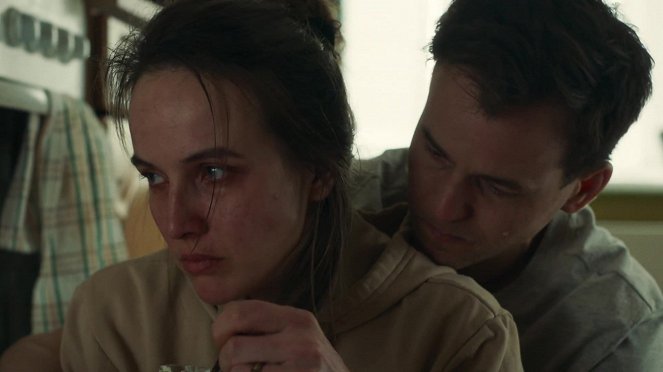Ohjaus:
Dan SvátekKäsikirjoitus:
Marta FenclováKuvaus:
Jakub ŠimůnekSävellys:
Jakub KönigNäyttelijät:
Tereza Ramba, Miloslav König, Martin Finger, Barbara Lukešová, Miroslav Hanuš, Jan Plouhar, Oskar Hes, Gabriela Štefanová, Alžběta Malá, Jan Janča (lisää)Juonikuvaukset(1)
She loved to laugh, and she loved to have fun. A drink or two was just part of it. But when she stayed at home with her new-born baby, something went wrong. The ever-present mother-in-law, the silent and submissive father-in-law, her husband at work… Everyone tells her that she has a problem, but she thinks they just want to hurt her. (Summer Film School)
(lisää)Videot (2)
Arvostelut (4)
The trailer touted it as the event of the summer of 2024, but unfortunately, the film's magic seems to have been left on the cutting room floor. I can't imagine how the creators managed to turn such great dramatic material, written by life itself, into a medley of life’s mini-episodes. The first half of the film doesn’t really work, jumping from place to place, from one period to another... I understand that maybe this was supposed to accelerate the plot and stir up the tension and drama, but it didn’t work for me at all. The second half of the film is noticeably better. The plot finally becomes more cohesive, and it’s easier to follow the character development. The post-production team also finally calmed down and stopped making alcohol ads, as well as camera and visual effects tricks... The film deservedly earns three stars for the acting performances, which were absolutely amazing and captivating from everyone, and for the story itself, which is truly powerful and definitely deserves attention.
()
Tereza Ramba has been delivering leading roles at the same decent level for the entire last decade, and her portrayal of an alcoholic comes as no surprise, not deviating from her usual performance. The real surprise, however, is the very weak script, especially in the second half, which, besides capturing the main story, couldn't resist the path of cautionary popularization, which in this form is entirely unnecessary in a fictional film. As a result, the film lacks sufficient space to address related themes, which become just insufficient fragments—the abortion of the second child, the main character's father's addiction, her second relationship after rehab... At the beginning, we follow a classic risky situation—a young couple moves into a multi-generational household, and while she is on maternity leave with her mother-in-law, he commutes a long distance to work. This is a complete cliché, rehashed many times, unfortunately played out here into a meaningless variation of similar series. And at the moment when things start to get serious, the state of peak addiction lasts only a very short time... and we're already rushing towards a happy ending. If this is what one of the best Czech films of the year is supposed to look like, then it's going to be another funeral.
()
A sort of "female version" of The Smiles of Sad Men, which was made into a film by the same director, Her Drunken Diary has a dense subject, but its power is somewhat lost in the sometimes fragmented narrative. Tereza Ramba gives a convincing performance, and the film stands largely on her portrayal of a woman who has sunk to the bottom of the liquor bottle. I liked the dream/mood sequences, they made an aesthetic impression on me. But in the second half I felt that they cut some scenes short at the expense of a flowing narrative. Still, this is a clear pointed finger at alcohol addiction that has the potential to appeal to a wide audience.
()
Watching Her Drunken Diary is sometimes like coming across an article titled “Ten Signs That You Have a Drinking Problem” among Prosecco ads in a lifestyle magazine. It’s a bit baffling when you use advertising aesthetics while pointing out in a cautionary way how alcohol ads connote luxury and such pleasure that your grey life will be inundated with saturated colours. However, this film is not pointless. ___ In the protagonist’s life, the colours gradually fade until shades of green predominate (her return to herself is unsurprisingly symbolised by red, the colour of life). As in melodramas, the development here happens not in the psychological depths, but mainly on the surface, whether that involves coloured surfaces or the protagonist’s body with her increasingly puffy face and a larger number of spots and bruises. And also as in melodramas, Míša’s fall is fatalistically reported starting with the first shot (and then a few flashforwards and an encounter with a homeless man). Otherwise, life with alcohol is realistically depicted as a spiral, when a person cannot escape the pattern of addiction and falls into the same shit again and again (and generally falls and stumbles...often like the characters in Marie Poledňáková’s comedies).___The protagonist’s predisposition to addiction is indicated by one brief flashback from her childhood with her alcoholic father. We similarly have to infer her background and what she actually does for a living (in any case, money is not a problem for her, as she moves to a large apartment in the centre of Prague). Her Drunken Diary is not really a psychological or social drama, though it does show conspicuous signals here and there that alcohol is a society-wide problem due to, among other things, the normalisation of drinking at parties, at home, after work... For me, this was mainly a love story about a woman who chose between a bottle of wine and a partner and ultimately – during the final act, when a lot of things suddenly happen all at once and everything is absurdly condensed – decides to focus on love primarily of herself. Thanks in part to limiting it to the most typical situations, I think this story may be inspiring for a lot of people in the target audience, especially in combination with the accompanying prevention campaign. 65%
()




Mainos